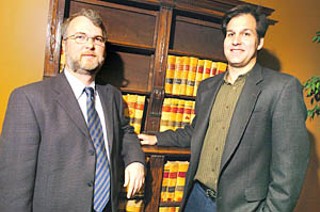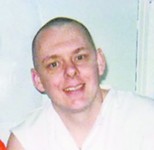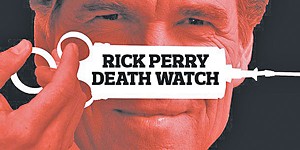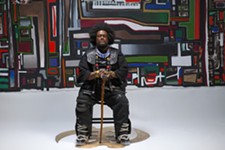UT Lawyers Take On the Death Penalty in D.C.
A team of UT-based attorneys takes the Tennard case to the U.S. Supreme Court
By Rita Radostitz, Fri., April 2, 2004

A few weeks ago, UT School of Law professor Robert Owen stood at a podium, his notes set out before him, waiting to be grilled by some of the best legal minds in the country. His client Robert Tennard had been convicted of capital murder and sentenced to death by a Harris Co. jury in 1986, and now the U.S. Supreme Court had agreed to determine whether jurors in Texas capital cases tried before 1991 (prior to changes in the law) had an appropriate way of giving effect to certain mitigating evidence – specifically, evidence that Tennard had an IQ of 67 when he committed his crime. Owen spent about 30 minutes making his argument and answering questions, and then sat down.
This exchange didn't take place in the majestic courtroom of the Supreme Court in Washington, D.C., but rather at the John B. Connally Center for the Administration of Justice on the UT campus. Owen, and his co-counsel Jordan Steiker and Richard Burr, spent many hours preparing for this mock argument – called a "moot" in legal circles. The three mock jurists were all UT School of Law faculty with an expertise in Supreme Court jurisprudence. They too spent many hours preparing for the argument – reading all the briefs submitted by both sides and anticipating questions Owen might expect from the real Supreme Court justices.
Owen was a Green Party candidate for the Court of Criminal Appeals in 2002 and has been involved in the defense of death penalty cases for over 15 years, but he had never argued before the Supreme Court. Steiker, says Owen, "was like my fight manager, making all the strategic decisions about how to choose to prepare." Steiker is well qualified for that task – he was a clerk for Justice Thurgood Marshall and observed more than 60 oral arguments before the Supreme Court. Burr is a nationally recognized capital defense specialist who has argued two death penalty cases before the Supreme Court.
Owen began the process of preparation three weeks before the March 22 argument. He went to New York University where he was grilled by capital defense attorneys Tony Amsterdam and George Kendall. Owen found their questioning to be "exceedingly difficult." "Tony asked questions we hadn't anticipated," Owen recalled, "which is, of course, why you do the moot."
Owen traveled to Washington, D.C., for two more moot arguments, one before a group of attorneys who handle Texas capital cases, the other at the Georgetown University Law Center Supreme Court Institute. The Georgetown program "judges" were all attorneys who have either clerked at the Court or argued cases there, and Steiker says that exercise "most resembled what actually happened" at the Supreme Court. The Georgetown moot, Owen added, helped him focus in order to "maintain an emotional keel," even in response to occasionally antagonistic questions.
The hardest part of this rigorous preparation process, says Steiker, is that "there is something very existential about it. You have to do your absolute best in case it matters, but you cannot be sure that it will make any difference at all." Because the number of cases reviewed by the Supreme Court is so small, the justices become familiar with the issues through the briefs filed by the parties, and by the time of the oral argument, most justices have already decided how they will vote. Owen also understood that he was unlikely to be able to present his argument as a whole because he would be interrupted by questions, so he had an outline of bullet points to use in his responses.
The argument itself went smoothly, with no unanticipated questions. And, despite Justice Antonin Scalia's occasional attempts to rile him, Owen remained calm, professional, and polished.
The outcome of the case remains uncertain, and an opinion probably will not be issued until June. "What is interesting about Tennard," says Steiker, "is that it is an issue that has no continuing significance" in Texas death penalty cases. It impacts directly only those defendants tried before the 1991 changes to the Texas death penalty statute (about 100 cases, according to Texas Assistant Attorney General Edward Marshall, who did not return a call requesting comment). Steiker surmises that in accepting the case for review, some members of the court are indicating a concern with the "reflexive extremism" in the Texas administration of the death penalty.
Got something to say on the subject? Send a letter to the editor.










